Lorena DiéguezLeader of the Medical Devices Research Group, INL- International Iberian Nanotechnology Laboratory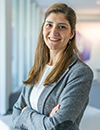 Lorena Diéguez joined INL in 2014 as a Staff Researcher and is, since 2018, the leader of the Medical Devices research group. Her research is mainly devoted to Translational Medical Research in close collaboration with hospitals and focuses on the development of tools and solutions based on microfluidics, biosensors and nanotechnology towards early diagnosis and better understanding of diseases. She is also very interested in translating her technology from the lab to the clinic and is co-founder and CEO of the spin-off company RUBYnanomed in the field of liquid biopsy. Currently, she is also the Chair of the Working Group in Medical Devices at the ETPN (European Technology Platform in Nanomedicine). She obtained her Bachelors in Physics with a Major in Optoelectronics at the University of Santiago de Compostela in 2005, then completed her Masters in Nanotechnology at the University of Barcelona (UB) in 2007 and her PhD in Biosensors at the UB, the Institute for Bioengineering of Catalonia and the ETH Zürich. Her postdoc at the University of South Australia (2010-2013) was devoted to the study of rare cells from biological samples using microfluidics. |
Rosanne GuijtProfessor, Deakin University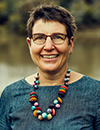 Prof Guijt specializes in microfluidic systems for chemical separation and analysis, and has pioneered the area of functionally integrated devices through the incorporation of electrodes and membranes. Currently a Professor at Deakin University, Geelong, Australia, Rosanne studied Biopharmaceutical Sciences at Leiden University, before commencing her PhD at Delft University of Technology, the Netherlands. After graduation, she received a fellowship from the Dutch Science and Technology Foundation STW to initiate Lab on a Chip research at the University of Tasmania in 2003, followed by a prestigious Australian Research Council Postdoctoral Fellowship (2004-2009) and a Alexander von Humboldt Fellowship for Experienced Researchers (2014/15 an 2016/17). Since 2014, she has led the adoption of 3D printing as an alternative fabrication approach in microfluidics. |
David JunckerProfessor and Chair, McGill University David Juncker stayed as a visiting scientist at the National Metrology Institute of Japan in Tsukuba from 1997-98. He conducted his PhD research at the IBM Zurich Research Laboratory from 1999-2002. He then pursued his studies as a Post-doc first at IBM Zurich until 2004, and then one year at the Swiss Federal Institute of Technology in Zurich (ETH). David started as an assistant professor in the Biomedical Engineering Department of McGill University in 2005, was promoted to associate professor with tenure in 2011, and became a full professor in 2016. As of early 2018, David serves as departmental chair of the Biomedical Engineering Department at McGill University. |
Maiwenn Kersaudy-KerhoasProfessor of Microfluidic Engineering, Heriot-Watt University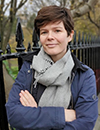 Maïwenn Kersaudy-Kerhoas is a Professor of Microfluidic Engineering at Heriot-Watt University in Edinburgh, Scotland. She leads a multi-disciplinary research group of biologists and engineers. Her work has focused on the development of robust, reproducible and affordable prototyping methods for point-of-care diagnostics. She has developed several pre-analytical tools for liquid biopsies applications with clinicians, including blood plasma separation devices, cell-free DNA extraction cartridges and a finger-actuated blood processing device. In 2013, she received a five year Royal Academy of Engineering Fellowship and in 2018 a Healthcare Technology Challenge Award from the UK Engineering and Physical Science Council. In 2019 she was awarded a Royal Academy of Engineering ‘Frontiers of Development’ and Global Challenge Research Fund seed funding to develop an advanced sepsis diagnostic tool via cell-free microbial nucleic sequencing with clinical partners around the world. She is a recipient of the 2023 Royal Academy of Engineering Frontiers Champion award, which she will use for the creation of a Frugal Diagnostic network. |
Thomas LaurellProfessor, Department of Biomedical Engineering, Lund University Thomas Laurell received his PhD in electrical engineering in 1995 at Lund University and obtained a position as associate professor in 1998 at Lund University performing research on lab-on-a-chip technology interfaced to mass spectrometry proteomics and disease biomarker research as well acoustic manipulation of cells and particles in microfluidics systems. He holds a position as Professor in Medical and Chemical Microsensors since 2000 with a focus on Lab-On-A-Chip technologies in biomedicine at the Department of Biomedical Engineering, Div. Nanobiotechnology and Lab-on-a-chip (http://bme.lth.se/research-pages/nanobiotechnology-and-lab-on-a-chip/). |
Noah MalmstadtProfessor, Mork Family Dept. of Chemical Engineering & Materials Science, University of Southern California Noah Malmstadt is Professor at the University of Southern California. He received a BS in Chemical Engineering from Caltech and a PhD in Bioengineering from the University of Washington. Following postdoctoral work at UCLA, he joined the Mork Family Department of Chemical Engineering and Materials Science at USC in 2007. Malmstadt is the recipient of a 2012 Office of Naval Research Young Investigator award. His research focuses on microfluidic strategies to facilitate material fabrication and biophysical analysis. He has pioneered the integration of ionic liquids as solvents in droplet microreactors and the application of microfluidic systems to synthesizing biomimetic cell membranes. Microfluidic analytical techniques he has developed include methods for measuring the permeability of cell membranes to druglike molecules and techniques for measuring ionic currents through membrane proteins. |
Steve SoperFoundation Distinguished Professor, Director, Center of BioModular Multi-Scale System for Precision Medicine, The University of Kansas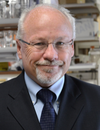 Prof. Soper is currently a Foundation Distinguished Professor in Chemistry and Mechanical Engineering at the University of Kansas, Lawrence. Prof. Soper also holds an appointment at Ulsan National Institute of Science and Technology in Ulsan, South Korea, where he is a World Class University Professor. He is also serving as a Science Advisor for a number of major worldwide companies. Prof. Soper is currently on the Editorial Board for Scientific Reports and Journal of Micro- and Nanosystems. |
Valérie TalyCNRS Research Director, Professor and Group leader Translational Research and Microfluidics, Université Paris Cité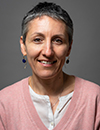 V. Taly is a CNRS research director and group leader of the Translational Research And Microfluidics team within the clinical oncology research unit MEPPOT (personalized medicine pharmacogenomics and therapeutic optimization) in the Cordeliers Research Center (university Paris Cité). Her team performs interdisciplinary researches aiming at developing and validating microfluidic tools for cancer research in close collaboration with clinicians and researchers in oncology and toxicology. Since 2008, she developed droplet-based digital procedures for Cancer diagnosis. Recently, her research has been dedicated to the clinical validation of droplet-based microfluidics for the non-invasive detection of Cancer biomarkers, the highlighting of new Cancer Biomarkers and the development of original tools and procedures for their detection with applications in personalized medicine, cancer recurrence detection and cancer diagnostics. She is co-founder of EMULSEO (2018) and METHYS DX (2021) start up companies. |




